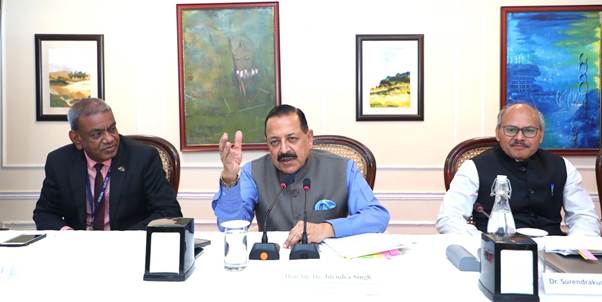Union Minister Dr. Jitendra Singh on Wednesday called for stronger collaboration between India and Mauritius in the blue economy, describing it as a shared area of opportunity for both maritime nations. Addressing a group of senior Mauritius bureaucrats at the National Centre for Good Governance (NCGG) in New Delhi, he said fisheries, ocean technologies, and desalination represent “new frontiers of sustainable growth and mutual prosperity.”
Dr. Singh said India’s experience in marine resource management and ocean-based technologies can play a vital role in helping Mauritius achieve its development goals. He highlighted India’s progress under initiatives such as the Deep Ocean Mission and its success in desalination technologies, which have brought potable water to island regions like Lakshadweep.
“Water, water everywhere, not enough to drink — this contradiction can be addressed through technology,” he said, noting that India’s desalination plants have not only produced drinking water from seawater but also generated clean energy in the process.
The Minister encouraged Mauritian officials to explore joint projects in marine research and ocean economy development, suggesting that both nations’ scientific institutions could collaborate on a ten-year blueprint for sustainable ocean growth. He added that partnerships in renewable energy, blue economy, and digital governance could enhance economic resilience and promote climate sustainability for island nations.
The visit by 17 senior officials from 14 Mauritian ministries is part of the 2nd Capacity Building Programme for Senior Civil Servants being conducted by NCGG from November 10 to 15. The initiative is part of a bilateral framework signed in March 2025, under which 500 Mauritian civil servants will be trained in India over five years. The current delegation is led by Dr. Dhanandjay Kawol, Senior Chief Executive of Mauritius’s Ministry of Public Service and Administrative Reforms.
Mauritian officials acknowledged India’s support in infrastructure, renewable energy, and governance reforms, including the establishment of a forensic science laboratory, deployment of floating solar projects, and digitalisation of education and social welfare systems. They also expressed interest in applying India’s experience in performance-based budgeting and fiscal accountability.
Dr. Singh emphasised that technology is a key driver of transparent and citizen-centric governance. “Technology contributes to transparency, and transparency leads to transformation,” he said, reflecting on India’s digital governance journey over the past decade.
Reiterating the deep cultural and historical ties between the two nations — with nearly 70 percent of Mauritians tracing their ancestry to India — Dr. Singh said the civil service training partnership represents an investment in “future-ready governance” and stronger bilateral cooperation.
As the programme continues, both sides are expected to explore collaboration in blue economy development, renewable energy, and desalination technologies, which Dr. Singh said could “define the next decade of India–Mauritius partnership.”










